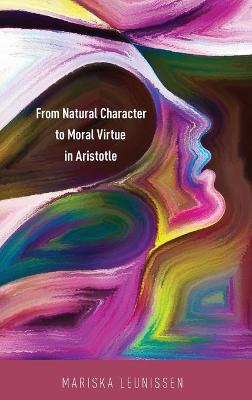(To see other currencies, click on price)
MORE ABOUT THIS BOOK
Main description:
From Natural Character to Moral Virtue in Aristotle discusses Aristotle's biological views about character and the importance of what he calls 'natural character traits' for the development of moral virtue as presented in his ethical treatises. The aim is to provide a new, comprehensive account of the physiological underpinnings of moral development and thereby to show, first, that Aristotle's ethical theories do not exhaust his views about character as has
traditionally been assumed, and, second, that his treatment of natural character in the biological treatises provides the conceptual and ideological foundation for his views about habituation as developed in his ethics. Author Mariska Leunissen takes seriously Aristotle's-often ignored-claim that nature is
one of the factors through which men become 'good and capable of fine deeds'. Part I ('The Physiology of Natural Character') analyzes, in three chapters, Aristotle's notion of natural character as it is developed in the biological treatises and its role in moral development, especially as it affects women and certain 'barbarians'-groups who are typically left out of accounts of Aristotle's ethics. Leunissen also discuss its relevance for our understanding of physiognomical ideas in Aristotle.
Part II ('The Physiology of Moral Development) explores the psychophysical changes in body and soul one is required to undergo in the process of acquiring moral virtues. It includes a discussion of Aristotle's eugenic views, of his identification of habituation as a form of human perfection, and of
his claims about the moral deficiencies of women that link them to his beliefs about their biological imperfections.
Contents:
Acknowledgements
List of tables
Abbreviations
Introduction
Part I: The Physiology and Science of Natural Character
Chapter 1: The Physiology of Natural Character
1.0 Introduction
1.1 A Well-Mixed Natural Character and the Ease of Habituation
1.2 The Relation between Natural Character, Blood, and Material Nature
1.3 Human Physiology, Blood, and Natural Character
Chapter 2: Changing Natural Character
2.0 Introduction
2.1 The Influence of Diet, Aging, and Disease on Natural Character
2.2 The Influence of Environmental Factors on Natural Character
2.3 Some Moral Implications of Aristotle's Views about Natural Character
Chapter 3: The Science of Natural Character
3.0 Introduction
3.1 Aristotle's Familiarity with the Science of Physiognomy
3.2 Physiognomy in Aristotle's Prior Analytics
3.3 Physiognomy in Aristotle's Biological Treatises
Part II: The Physiology of Moral Development
Chapter 4: Eugenics and the Production of Good Natural Character
4.0 Introduction
4.1 The Production of Male Offspring with 'Good' Bodies and Characters in the Ideal City
4.2 The Moral Advantages and Heredity of 'Good Birth' and 'Natural Talent'
4.3 A Biological Account of the Heritability of Natural Character
Chapter 5: Perfection and the Psychophysical Process of Habituation
5.0 Introduction
5.1 The Acquisition of Character Virtue in Physics VII 3
5.2 Perfection and the Psychophysical Process of Habituation in the Ethical Treatises
5.3 A Psychophysical Account of Habituation based on Physics VII 3
Chapter 6: The Natural Character and Moral Deficiencies of Women
6.0 Introduction
6.1 The Generation of Women and their Biological Imperfection Relative to Men
6.2 From Natural Character to the Virtue of Assistants in Women
6.3 A Psychophysical Account of the Moral Deficiencies in Women
Chapter 7: Conclusion
Bibliography
Index of texts
Index of subjects
PRODUCT DETAILS
Publisher: Oxford University Press (Oxford University Press Inc)
Publication date: September, 2017
Pages: 232
Dimensions: 156.00 x 242.00 x 22.00
Weight: 468g
Availability: Available
Subcategories: Physiology

